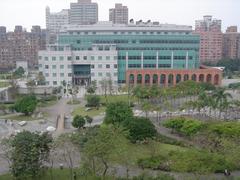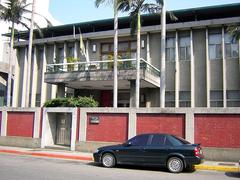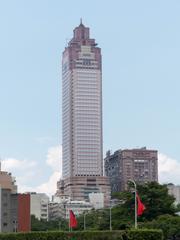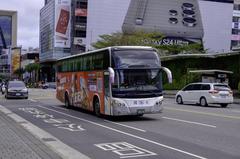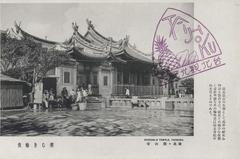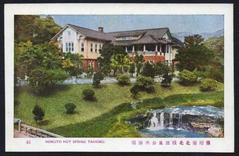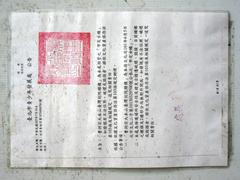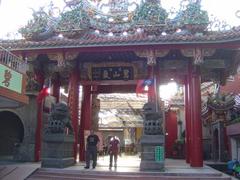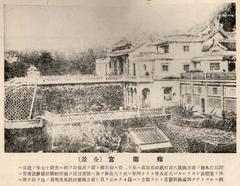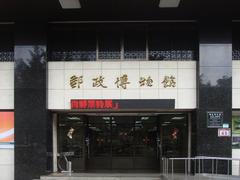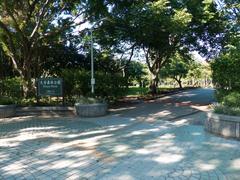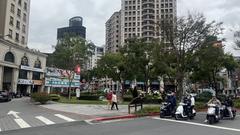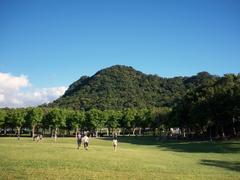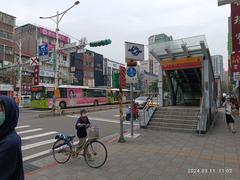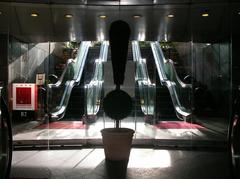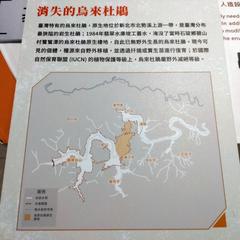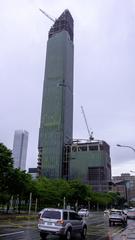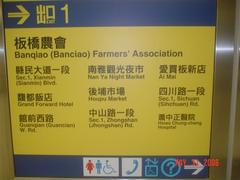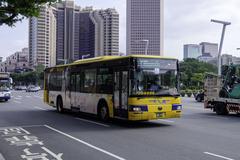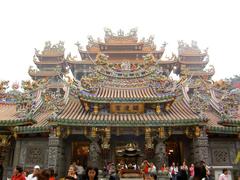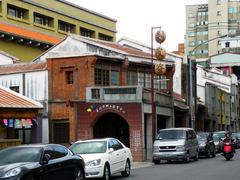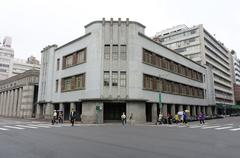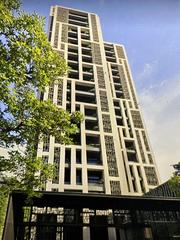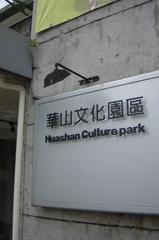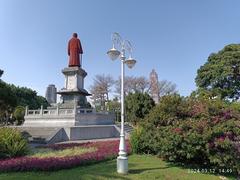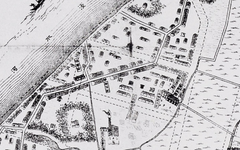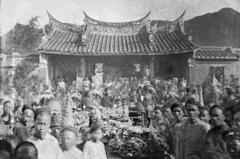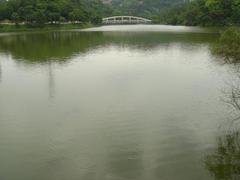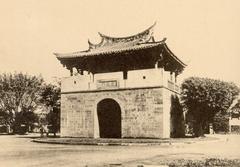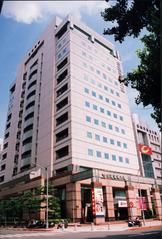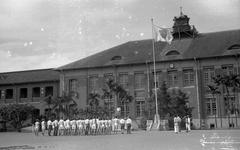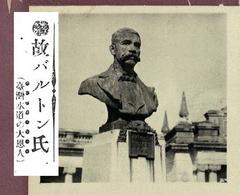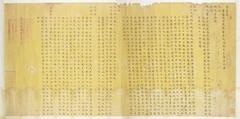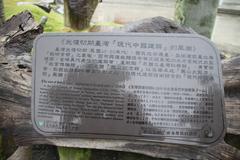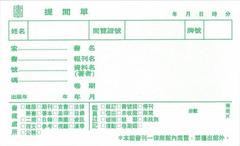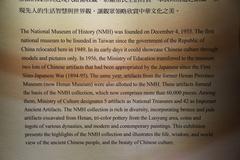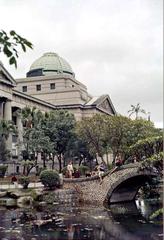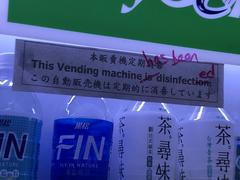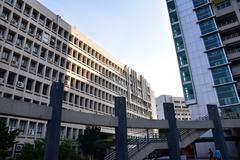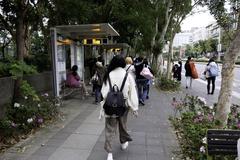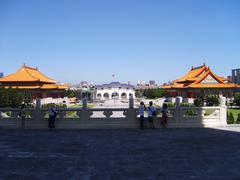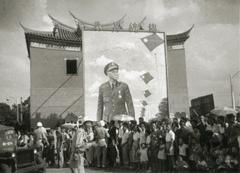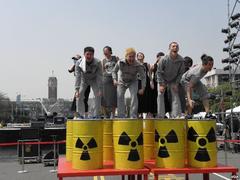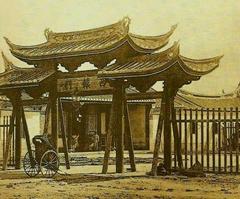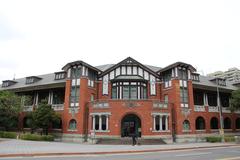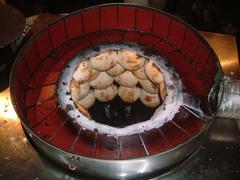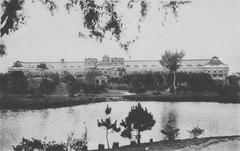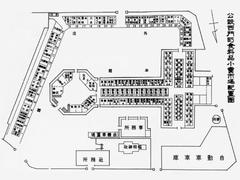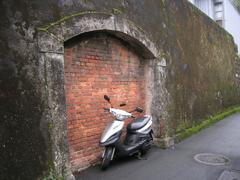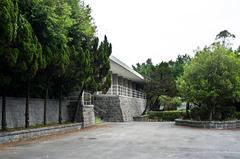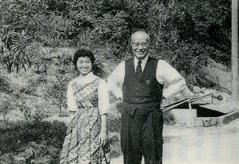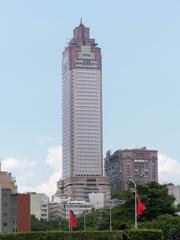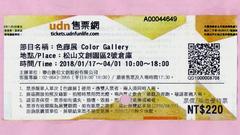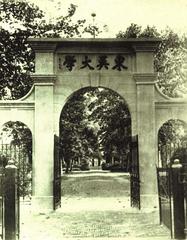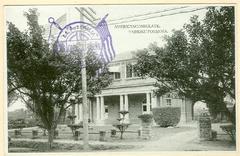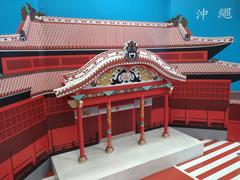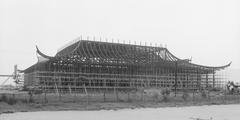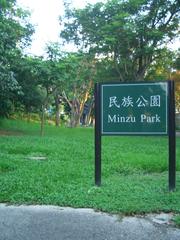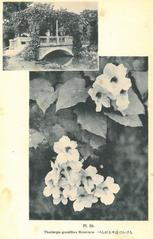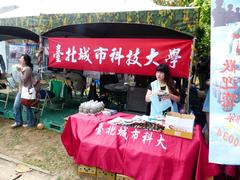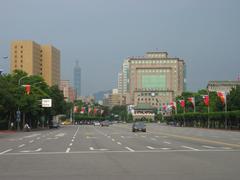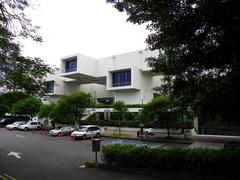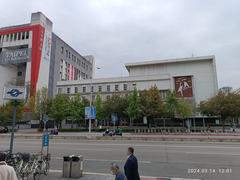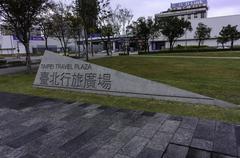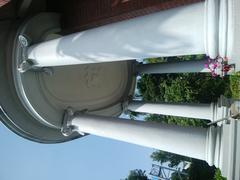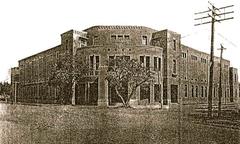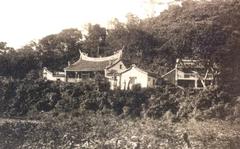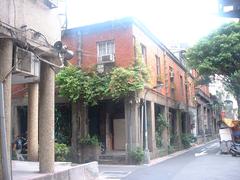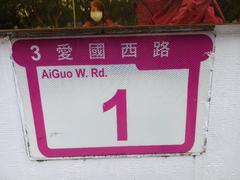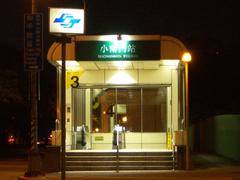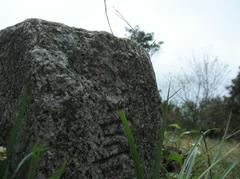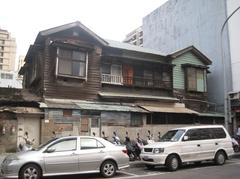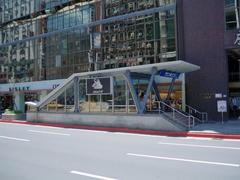
Tianma Tea House Taipei: Visiting Hours, Tickets, and Historical Significance
Date: 04/07/2025
Introduction
Tianma Tea House (天馬茶房) stands as a profound symbol of Taiwan’s rich cultural heritage and turbulent political history, located in the heart of Taipei’s historic districts. Established in the vibrant Dadaocheng neighborhood, Tianma Tea House is best known as the flashpoint of the February 28 Incident (228 Incident) of 1947, a pivotal event shaping Taiwan’s modern democratic journey. While the original tea house played a key role as a social hub during the Japanese colonial era, its legacy today is that of a memorial site, commemorating the struggles and resilience of the Taiwanese people against authoritarian rule. Visitors can immerse themselves in these narratives while appreciating the nuances of traditional tea culture, making it a compelling destination for history enthusiasts, cultural explorers, and tea lovers alike.
In addition to the historic Dadaocheng site, there is a renowned Tianma Tea House in Taipei’s scenic Maokong district, celebrated for its authentic tea ceremonies and breathtaking panoramic views. This venue highlights Taiwan’s high-mountain oolong teas and offers a serene tea experience, providing a different yet equally enriching dimension of the Tianma Tea House legacy.
This guide comprehensively covers the history and cultural significance of Tianma Tea House, essential visitor information including visiting hours and tickets, accessibility, nearby attractions, and practical travel tips. Whether you are interested in Taiwan’s political past or its vibrant tea culture, this article will help you navigate and appreciate these unique facets of Taipei’s heritage. For further exploration, valuable resources include the official 228 Incident memorial website (228.org.tw) and travel insights from TripJive.
Table of Contents
- Introduction
- Historical Background of Tianma Tea House
- Cultural and Political Significance
- Visiting Tianma Tea House (Dadaocheng)
- Nearby Attractions and Suggested Itinerary
- Cultural Etiquette and Remembrance
- Maokong Tianma Tea House
- Frequently Asked Questions (FAQ)
- Visuals and Media Recommendations
- Conclusion
- Sources
Historical Background of Tianma Tea House
Origins and Early Development
Founded shortly after 1934 by Zhan Tianma, a popular orator and lyricist, Tianma Tea House emerged within Taipei’s bustling Dadaocheng district—a hub for tea trading and commerce. The tea house combined traditional Taiwanese architectural details with influences from the Japanese colonial era (1895–1945). More than a place for tea appreciation, it was a vital social institution where merchants, intellectuals, and artists gathered for conversation, artistic exchange, and political discussion. Dadaocheng’s prominence in the global tea trade, with figures like British merchant John Dodd promoting Taiwanese oolong tea overseas, directly contributed to the tea house’s status as a cultural focal point.
The February 28 Incident and Historical Significance
On the evening of February 27, 1947, a confrontation near Tianma Tea House between a Taiwan Tobacco and Wine Monopoly Bureau officer and a cigarette vendor escalated, resulting in a bystander being shot. This incident triggered the February 28 Incident, a major uprising against the Kuomintang (KMT) government, which led to a severe crackdown, extended martial law, and the White Terror period (228.org.tw). Tianma Tea House, as the incident’s flashpoint, is memorialized today with a commemorative plaque and annual remembrance events.
Evolution, Closure, and Preservation
Following the 228 Incident, Tianma Tea House closed, along with other establishments linked to the uprising. The original building, situated at Nanjing West Road and Yanping North Road, was demolished in 2005. In 2011, a new structure was built on the site, with the tea house’s name revived on the third floor as a tribute. A copper plaque marks the precise site of the incident, serving as a focal point for commemoration.
Cultural and Political Significance
Symbol of Civic Resistance and Democratic Aspirations
Tianma Tea House remains a symbol of civic resistance and Taiwan’s democratic aspirations. In the aftermath of the February 28 Incident, it became a gathering spot for protestors and civic groups advocating for justice and reform (228.org.tw). It stands as a testament to the collective memory and ongoing struggle for democratic ideals in Taiwan.
Annual Commemorations and Civic Engagement
Each year, Tianma Tea House features prominently in 228 Incident commemorations. Civic organizations and citizens gather for marches and ceremonies, underlining the importance of historical memory in Taiwan’s identity. On the 73rd anniversary, for instance, over 1,000 participants from more than 40 civic organizations marked the occasion at the site (The Free Library).
Tea Culture and Political Memory
The tea house is not only a historical landmark but also a living space for Taipei’s tea culture. Visitors can experience traditional tea ceremonies and appreciate the ritual of tea brewing, offering a unique blend of cultural heritage and political history (TripJive).
Contemporary Political Significance
Tianma Tea House’s legacy continues to influence contemporary Taiwan. The site reinforces the importance of civic engagement and serves as an educational resource for those seeking to understand the cost of authoritarianism and the value of democracy. February 28 is now a national day of remembrance (228.org.tw).
Visiting Tianma Tea House (Dadaocheng)
Location and Accessibility
Located in Taipei’s Datong (Dadaocheng) district, Tianma Tea House sits at Nanjing West Road near Yanping North Road, within walking distance of Dihua Street and other historic sites. The closest MRT stations are Beimen (Green Line) and Zhongshan; Taipei Main Station is a 15-minute walk away. The area is served by multiple bus lines, taxis, and ride-sharing services.
Visiting Hours and Tickets
- Memorial Site Hours: Publicly accessible at all hours; there are no official opening or closing times.
- Admission: Free; no tickets required.
Guided Tours and Special Events
Tianma Tea House is commonly included in historical walking tours of Dadaocheng, especially around the February 28 commemoration. Nearby, the Taipei 228 Memorial Museum provides deeper historical context and is recommended for those seeking a comprehensive understanding.
Visitor Facilities and Amenities
There are no dedicated visitor facilities (restrooms, visitor center) at the memorial site itself, but the area is pedestrian-friendly and offers numerous convenience stores, cafes, and restaurants. Photography is permitted—please remain respectful, especially during commemorative events.
Best Times to Visit
- February 28 Commemoration: The most meaningful time to visit is during the annual remembrance, though crowds and a solemn atmosphere are to be expected.
- General Visits: Early mornings or late afternoons are best for avoiding crowds and capturing photos. Spring and fall offer the most comfortable weather conditions.
Practical Tips
- Language: Most signage is bilingual (Mandarin/English). Basic Mandarin or a translation app is helpful.
- Weather: Bring water, sun protection, and rain gear as needed.
- Accessibility: The site has street-level access with some uneven sidewalks.
- Safety: The area is safe; exercise standard urban precautions.
- Amenities: Nearby shops and cafes offer restrooms and refreshments.
Nearby Attractions and Suggested Itinerary
Enhance your visit by exploring:
- Dihua Street: Qing Dynasty architecture and traditional markets (Taiwanderers).
- Taipei 228 Memorial Museum: In-depth exhibits on the 228 Incident.
- Dadaocheng Wharf: Scenic riverside with food stalls and ferry access.
- Longshan Temple: Iconic temple accessible via a short MRT ride.
- Songshan Cultural and Creative Park: Hub for contemporary arts and crafts.
A suggested half-day itinerary: morning at Tianma Tea House, stroll through Dihua Street, lunch locally, and afternoon at the 228 Memorial Museum.
Cultural Etiquette and Remembrance
Tianma Tea House is a site of national mourning and historical trauma. Visitors should be respectful and avoid casual or recreational behavior (Taipei Times). Floral offerings and moments of silence are common during commemorations. Modest attire is recommended.
Maokong Tianma Tea House
Location and Getting There
Located in the scenic Maokong district, Tianma Tea House is reachable via the Maokong Gondola, which connects Taipei Zoo to Maokong. The gondola ride provides panoramic views and takes about 20–30 minutes. From Maokong Station, it’s a 10–15 minute walk to the tea house (The Smart Local). Taxis and hiking trails are alternate options.
Visiting Hours and Reservations
- Hours: Generally 10:00 AM–6:00 PM daily; check their official site for updates.
- Admission: No entry fee; reservations are recommended for peak times or groups.
Tea Experience and Menu
Tianma Tea House specializes in high-mountain oolongs (Jin Xuan, Tieguanyin) served gongfu style. The menu includes tea-infused dishes and Taiwanese specialties, with tea sets from NT$300–NT$600 and main dishes from NT$200–NT$400 (The Smart Local). Staff will often demonstrate brewing techniques upon request.
Ambience and Photographic Spots
Indoor and outdoor seating is available. The outdoor terrace boasts spectacular views of Taipei’s skyline, including Taipei 101, and the surrounding tea fields—ideal for photography.
Events and Guided Tours
Special tea ceremonies, seasonal events, and guided tours are occasionally offered and require advance booking.
Accessibility and Practical Tips
- Language: Basic English is spoken; menus typically have English translations.
- Payment: Cash is preferred; some credit cards/EasyCard may be accepted (Bon Traveler).
- Accessibility: The gondola and main paths are wheelchair accessible, but the tea house may have steps—check in advance.
- Dress: Comfortable attire and sturdy shoes are advised.
- Etiquette: Enjoy multiple infusions, keep noise levels low, and ask before photographing staff or other guests.
Nearby Attractions
- Maokong walking trails
- Temples and tea museums
- Glass-bottom “Crystal Cabins” on the Maokong Gondola
- Local accommodations for an immersive experience (Janice Rohrssen)
Frequently Asked Questions (FAQ)
Dadaocheng (Historic Site)
Q: Are there entrance fees or tickets for Tianma Tea House?
A: No, the site is free and open to the public at all times.
Q: What are the official visiting hours?
A: The memorial is accessible 24/7.
Q: Are guided tours available?
A: Included in historical walking tours of Dadaocheng/Datong, often in English and Mandarin.
Q: When is the best time to visit?
A: The most significant time is during the 228 Incident commemoration on February 28; for general visits, spring and fall are ideal.
Q: Is photography allowed?
A: Yes, but please be respectful.
Q: Are there facilities on-site?
A: No; nearby shops and cafes provide amenities.
Maokong (Tea House Experience)
Q: What are Tianma Tea House visiting hours?
A: Typically 10:00 AM–6:00 PM daily; confirm before visiting.
Q: Is there an entry fee?
A: No general fee; special events or tours may require tickets.
Q: How to get tickets for the Maokong Gondola?
A: Purchase at Taipei Zoo or Maokong Station; online booking is sometimes available.
Q: Is the tea house wheelchair accessible?
A: Main paths are, but check for steps at the tea house itself.
Q: Can I make reservations?
A: Yes; advisable during busy times.
Q: Are there guided tours or special events?
A: Occasionally; check official channels for schedules.
Visuals and Media Recommendations
- Include images of the Tianma Tea House façade, commemorative plaque, and Dihua Street.
- Provide a map showing proximity to MRT stations and attractions.
- Feature photos of Maokong’s outdoor terraces, tea ceremonies, and panoramic views.
- Use descriptive alt tags with keywords like “Tianma Tea House visiting hours,” “Tianma Tea House tickets,” and “Taipei historical sites.”
Conclusion
Tianma Tea House is much more than a historical site or a venue for tea; it embodies Taiwan’s enduring spirit of resistance, democratic aspirations, and cultural pride. The Dadaocheng site offers solemn reflection on the February 28 Incident, while the Maokong tea house provides an authentic, tranquil tea experience. Both sites invite visitors on a meaningful journey through Taiwan’s complex history and rich traditions.
To maximize your visit, plan according to recommended hours, consider joining guided tours, and respect the cultural and commemorative atmosphere. For a deeper engagement with Taiwan’s heritage, Tianma Tea House remains a poignant and inspiring destination. For up-to-date information and guided tour options, explore official resources, download the Audiala app, and follow related social media channels.


